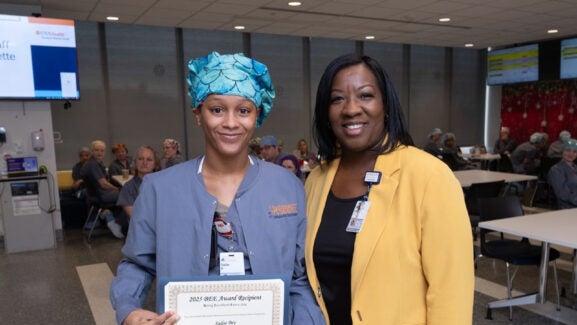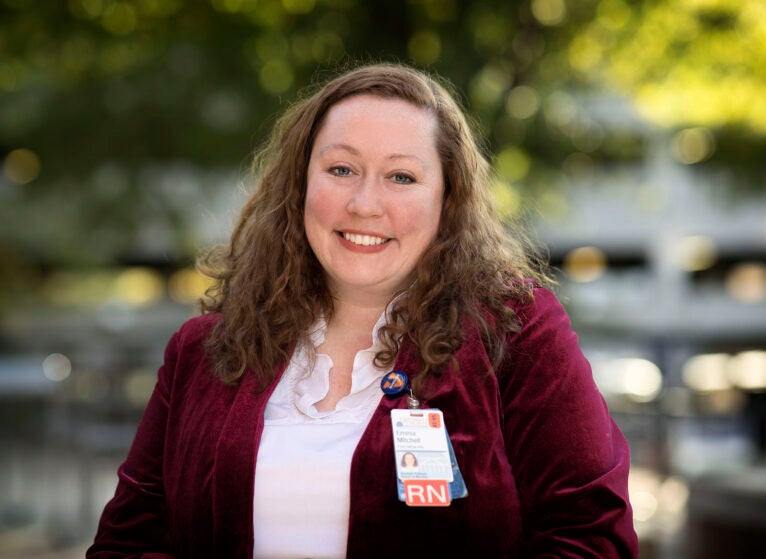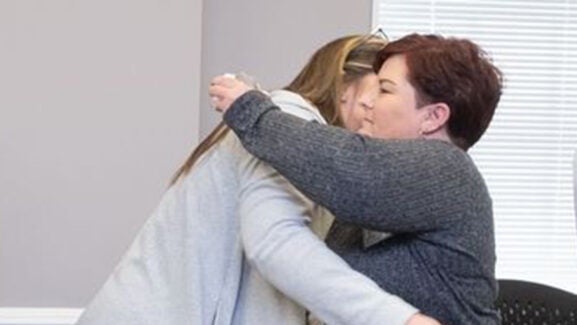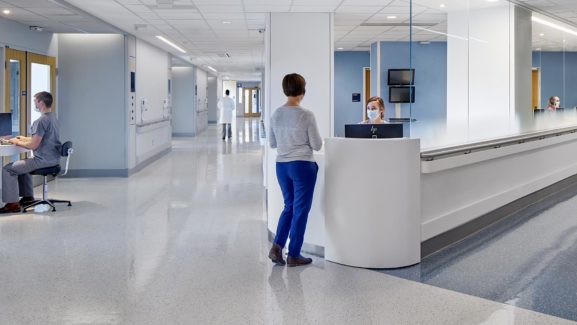

(Photo by Dan Addison, University Communications)
Women’s History Month Team Member Spotlight: 6 Questions With Dr. Emma Mitchell
In honor of International Women’s Day and Women’s History Month, we’re excited to spotlight Emma M. Mitchell, PhD, MSN, RN, Associate Professor of Nursing, Director, Global Initiatives.
Dr. Mitchell joined UVA Health in 2014, and is making an impact in a couple of areas of our strategic plan, including the goals of expanding our excellence and enabling discoveries for better health and cultivating healthy communities and belonging for all. Read on to learn more about Dr. Mitchell’s incredible work to reduce cervical cancer and mortality rates in women in Nicaragua.
Why did you go into the healthcare field?
Mitchell: Health equity and social justice have always been key driving forces that compelled my nursing career forward. Early on in nursing school, I gravitated toward care of, and research centered on women’s health and global health, and, in particular, on cervical cancer as a cancer of disparities. We have excellent tools to prevent cervical cancer, through vaccination, screening/early detection, and treatment, and yet still see 85 to 90% of the disease burden hits low- and middle-income countries where access to these preventive services is often limited. No one has to die of cervical cancer and yet, in many places, many, many women still are.
What are you most proud of in your research at UVA Health?
Mitchell: My current NIH-funded research — which developed, deployed, and is testing the impact of a mobile health intervention and protocol that increases cervical cancer screening and services to Nicaraguan women living on the Caribbean Coast, where the cancer is a leading cause of mortality — is the culmination of more than a decade of sustained collaboration with Nicaraguan partners. But much of the work we’re doing in Nicaragua is informed by studies I’ve done with interprofessional partners here in Virginia, and with UVA Cancer Center, on HPV screening methods and novel follow-up models that reduce women’s risk of dying of cervical cancer. Our work is very much in sync with the World Health Organization’s (WHO), which seeks to increase access to and uptake of HPV vaccination and eliminate cervical cancer around the globe within the next century.
Of course, I’m also very proud of mentoring nearly 250 nursing students in global health and women’s health research and nurturing these future nurse scientists along their own pathways: They inspire me and are so needed.
Who were some of your earliest women role models, and why?
Mitchell: My mother — a now-retired psychiatric clinical nurse specialist and a former university professor — was my earliest female role model. She was an incredible advocate for patients and students and was always looking for ways to connect at-risk, vulnerable populations with the healthcare services and resources that could truly help them.
Is there a particular woman you admire today?
Mitchell: I admire women who are leading cervical cancer elimination efforts, both in their home countries and globally. One is Dr. Nono Simelela (@DrNonoSimelela), the assistant director general at the WHO and a special advisor to the director general on strategic priorities for cervical cancer elimination. She and her team work to increase access to HPV vaccination globally through advocacy at national levels.
What more can we be doing as a health system to embrace equity?
Mitchell: I think continued efforts in community outreach and engagement, both here and across Virginia, is vitally important. I’ve been a member of the UVA Cancer Center’s “Cancer Center Without Walls” advisory board since 2014, which engages key stakeholders in the furthest Southwest counties of our rural catchment area and works to identify locally relevant cancer prevention initiatives and strategies and works to implement them. That on-the-ground support, person-by-person, is critical.
How does your research/work impact and further advance our strategic goal of “Expanding our Excellence and Enabling Discoveries for Better Health” or “Cultivating Healthy Communities and Belonging for All;” whichever goal best applies to your work?
Mitchell: My research impacts the strategic goal of “Expanding our excellence and enabling discoveries for better health” in that it is globally focused, and centers on a tailored innovation in cervical cancer screening models. My teaching impacts the strategic goal of “cultivating healthy communities and belonging for all.” I teach the undergraduate community/public health nursing rotation for third- and fourth-year nursing students, which includes both in class didactic lessons and out-the-nursing-school clinical rotations. For the latter, we work with community-based agencies and institutions to show students not only the challenges community members face, but also help them understand what resources are available and how they’re best navigated. Our students see firsthand what the impact of cultivating “belonging for all” can be.
Latest News



